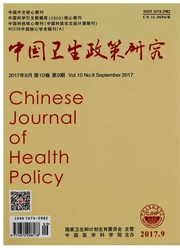

 中文摘要:
中文摘要:
建国以来,我国疟疾防治工作取得显著成效,目前已经基本建立较完备的疟疾防治政策体系。我国60多年疟疾防治工作主要分为四个阶段,政府针对各个阶段的疫情情况以及社会环境适时地制定和调整一系列防治疟疾的政策法规。本文回顾了我国疟疾防治政策的历史演变,从各阶段疟疾疫情规模、主要政策内容及其特点等方面进行系统梳理归纳。在此基础上分析在政策指导下我国疟疾防治工作所取得的成绩以及在今后的防治工作中面临的挑战,从而提出制定和完善我国消除疟疾政策的若干建议,为我国实现消除疟疾的目标提供参考依据。
 英文摘要:
英文摘要:
Since the founding of the State, China has obtained remarkable achievements in Malaria control works; and has presently established a more complete malaria control policy system. The Malaria control works were divided into four stages during the past over 60 years. A series of policy strategies and regulations on malaria control were formulated by the government in response to the severity of epidemic situation and social environment at all sta- ges. This paper reviews the historical evolution progress of malaria control policies, and systematically summarizes the scale of malaria epidemic, and the main content and features of the policies in each stage. In view of this and under the guidance of the policies, this study analyzes the achievements of malaria prevention and control works and makes in- depth exploration on the challenges in the future implementation of the policies, thereby putting forward some rele- vant suggestions for the formulation and improvement of the country's malaria eradication policies in order to achieve the goal of malaria prevention and control.
 同期刊论文项目
同期刊论文项目
 同项目期刊论文
同项目期刊论文
 期刊信息
期刊信息
